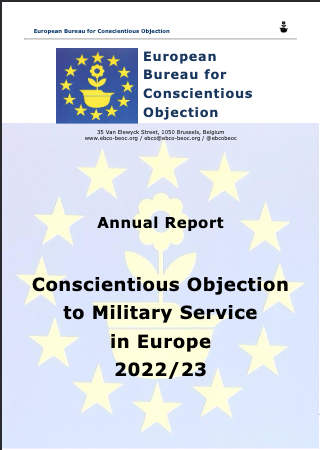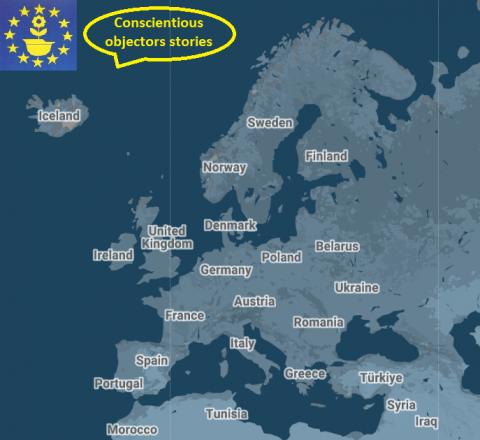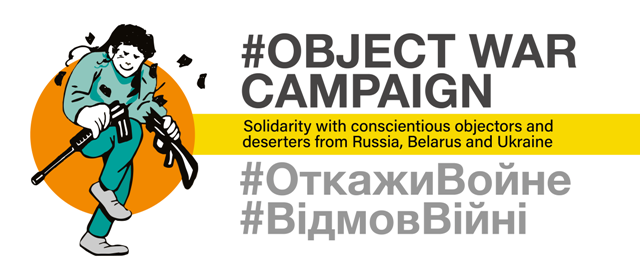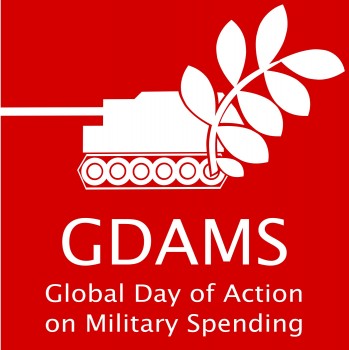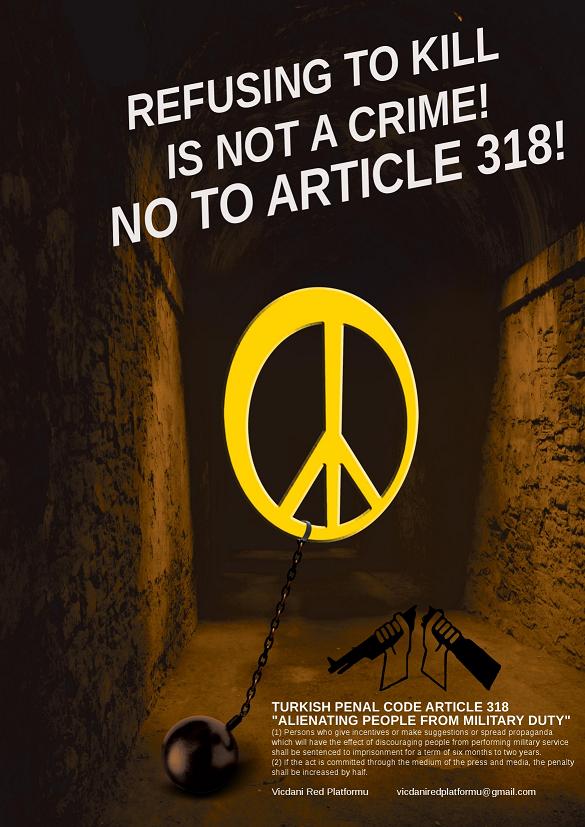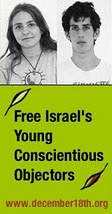Ukraine

|
|
Conscription: |
Yes |
Reintroduced in 2014 (earlier suspended in 2012). |
|
Conscientious objection: |
1991 |
First recognised in the Law of Ukraine “On Alternative (Non-Military) Service” № 1975-XII of 12 December 1991. |
|
|
Service
|
Military: *Suspended |
18 |
12 months for holders of master's degree. |
|
Civilian: *Suspended |
27 |
18 months for holders of master's degree. |
|
|
Minimum
|
Conscription: |
18 |
Compulsory in the age of 18-26. |
|
Voluntary enlistment: |
17 |
Under 18 for military schools: 17 for cadets |
|
|
More |
|||
Conscientious objection to military service in Ukraine, insufficiently protected by Ukrainian law before 2022, was effectively denied on disputed legal grounds (with small number of exceptions) by wartime policies after introduction of martial law because of full-scale Russian invasion on 24 February 2022. Conscientious objectors risk to be forcibly conscripted, detained, persecuted for their refusal to take arms, suffer from social stigma, lack of legal recognition and access to alternative service, inability to leave the country.
International critique of wartime and previous human rights violations related to compulsory military service, including EBCO’s call to release immediately and unconditionally prisoner of conscience Vitaliy Alexeenko[1], apparently, was ignored by the government of Ukraine – as in previous years, before full-scale invasion, recommendations of international human rights institutions and organizations regarding protection of the right to conscientious objection were apparently ignored by the government and law enforcement agencies of Ukraine, relevant legislation was not changed in accordance with international human rights standards and perpetrators of arbitrary detentions of conscripts were not held accountable. In result, harsh stopping and arrests of conscripts at the streets, their abduction and arbitrary detention became usual and even partially legalized practice[2], despite some scandalous cases are formally investigated[3][4] (there is no information regarding trials on perpetrators).
After introduction of martial law, regular term-limited conscription planned for 2022 by presidential decree in December 2021 was cancelled by a presidential decree in April 2022. Instead, term of service of conscripts was prolonged until the end of martial law, which continues with no signs of ending when this report was written, and military mobilization measures were taken (with new draftees conscripted for indefinite term) to increase size of army four times, so its current size exceeds one million of soldiers.
Conscription in Ukraine during martial law and military mobilization engages all males in the age from 18 to 60 with mandatory military registration of males from the age of 16 and female professionals in medicine or pharmacy. Military registration includes medical examination of fitness for service, and in absence of reasons for deferral, especially when personnel is needed because of losses on frontline, anybody could be conscripted immediately when declared fit to serve. In a number of cases military medics scandalously failed to found unfit crippled and seriously ill people. For these reasons many people fear to undergo military registration even when served with an order (summons) and failure to appear could entail a significant fine. To coerce people for military registration, regulations regarding presenting proofs of it in many spheres of civilian life are introduced. For example, military ID is usually asked for mandatory registration of place of residence, to access education, employment, marriage, social security benefits and other state services.
All males in age from 18 to 60 are considered subjects to military service unless exempted, they can’t change place of residence without permission of the local military commissar and prohibited from leaving Ukraine, with some exceptions; as was noted by UN human rights monitors, this policy is questionable both in its legality and reasonableness of breaching human rights[5][6].
Legal recognition of conscientious objection in Ukraine is regulated by the restrictive 1991 law of Ukraine on alternative non-military service[7], usually applied by the military recruitment centers and by local administrations, responsible for organization of the alternative service, in varying interpretations. Going beyond these restrictive regulations, it is theoretically possible to invoke broader norms of Art. 35 (4) of the 1996 Constitution of Ukraine, Art. 18 of ICCPR and Art. 9 of ECHR which formally are part of Ukrainian legislation, but in the most cases such appeal to broader norms is ignored or rejected with reference to restrictive regulations of the said law, even by courts, with very few exceptions. Ukrainian government is not willing to comply with international human rights law in this regard and imposed restrictions on the right of freedom of expression for public critique of Armed Forces of Ukraine and advocacy of conscientious objection to military service in Ukraine[8].
Practice of denial to recognize conscientious objection in military recruitment offices is explained by a letter of the Ministry of Defence of Ukraine of 21 August 2022 which says: "Due to martial law, since 24.02.2022 the temporary military service in Ukraine is no longer implemented. Therefore, the implementation of alternative service is not applicable."[9] However, even Ukrainian national human rights institution recognizes illegitimacy of such practices. According to the letter of the Commissioner for Human Rights of the Verkhovna Rada of Ukraine Dmytro Lubinets to the Executive Secretary of the Civic Organization "Ukrainian Pacifist Movement" Yurii Sheliazhenko No. 241.8/Ш/160.7/23/23/55 dated 03.03.2023: “legal norms according to which the right of the State to oblige its citizens to undergo military service is not absolute and is limited to the right of every person to refuse to perform military service, in particular for reasons of religion, are established in international treaties, the consent to the binding legal force of which was given by the Verkhovna Rada of Ukraine, in particular in the article 9 of the Convention on the Protection of Human Rights and Fundamental Freedoms (hereinafter referred to as the Convention), as well as Article 18 of the International Covenant on Civil and Political Rights. At the same time, the right to refuse military service based on religious beliefs is absolute. Therefore, the state cannot impose restrictions on the freedom to practice one's religion through compulsory military service. Although the procedure for resolving the issue of referral to alternative (non-military) service is regulated by the provisions of the Law of Ukraine "On Alternative (non-military) Service", which does not contain legal norms regarding the conscription of citizens of Ukraine for military service during mobilization for a special period - the Constitution of Ukraine and international treaties have higher legal force (superiority over other domestic legislative acts), and therefore the right of a person to alternative service (i.e., exemption from military service upon conscription) is absolute and cannot be limited due to the absence (lack of regulation by the laws of Ukraine) of the procedure for replacing military service with alternative service during martial law”[10]
Since privileged confessions, traditionally allowed to alternative service, established special relations with military authorities, they are not willing to advocate right to refuse to kill publicly and almost never describe themselves as pacifist churches. In reward for such loyalty, public support of army and war effort, humanitarian aid to army and population, and sometimes because of corruption arrangements, such small and insular communities, or at least members of their leading families, could be spared from some burdens of mobilization, and their male clergy even could be allowed to travel abroad. There are signs of pressure on religious communities by the military, for example, when recruitment center successfully challenges in the court inaction of police in rare case when police refuses to open criminal investigation after a crime report accusing in draft evasion a CO who belongs to one of privileged churches.
While the army insists, that during martial law alternative service is not allowed, local administrations (turned into local military administrations with introduction of martial law) more or less embrace this position but may deviate from it. Using their discretion, local military administrations in some cases: allowed some COs to continue their alternative service under martial law (at least in 18 oblasts of 24 and Kyiv city); prolonged term of alternative service until the end of martial law saving COs from obligation to undergo military registration and risk to be conscripted after the end of their alternative service (Brovary Raion of Kyiv Oblast); granted or held pending applications for alternative service under martial law (Dnipropetrovsk, Chernihiv and Sumy Oblasts, Kyiv city). There are, however, lot of cases when local administrations rejected applications of conscientious objectors or terminated alternative service under martial law. For example, in 2022 local military administrations of Ivano-Frankivsk region rejected 117 (i.e. 100% of) applications for alternative service, 104 of which were lodged under martial law. In Kyiv oblast, some COs were allowed to continue alternative service but for others it was terminated.
Annual survey of Ukrainian Pacifist Movement revealed 53% decrease at the end of 2022 in number of conscientious objectors at alternative service among regions where local military administrations provided relevant numbers (among those who refused, one answer was “information became a weapon and its dissemination now could damage safety of people”). Lacking updated information from Volyn, Mykolaiv, Poltava, Rivne, Kherson and Cherkasy Oblasts, we can confirm that 617 COs conducted alternative service in Ukraine in 2022, comparing to 1659 in 2021.
Number of reported COs on alternative service by regions of Ukraine in 2022, comparing to 2021
|
Region / # of COs, year |
2022 |
2021 |
|
Chernihiv Oblast |
6 |
17 |
|
Chernivtsi Oblast |
33 |
150 |
|
Dnipropetrovsk Oblast |
29 |
54 |
|
Donetsk Oblast |
27 |
52 |
|
Ivano-Frankivsk Oblast |
78 |
141 |
|
Kharkiv Oblast |
68 |
93 |
|
Khmelnytskyi Oblast |
43 |
112 |
|
Kirovohrad Oblast |
28 |
37 |
|
Kyiv (city) |
32 |
46 |
|
Kyiv Oblast |
24 |
43 |
|
Luhansk Oblast |
1 |
11 |
|
Lviv Oblast |
74 |
130 |
|
Odessa Oblast |
37 |
41 |
|
Sumy Oblast |
26 |
35 |
|
Ternopil Oblast |
25 |
33 |
|
Vinnytsia Oblast |
12 |
36 |
|
Zakarpattia Oblast |
39 |
61 |
|
Zaporizhzhia Oblast |
21 |
52 |
|
Zhytomyr Oblast |
14 |
30 |
Oppressive treatment of objectors, lack of respect to human rights and peace culture in society which allows to exist shameful stigma around refusal to serve in army are factors that erode difference between conscientious objection and draft evasion. Without proper peace studies, legitimization of conscientious objection and development of legal popular peace movements, transparently financed, ethically consistent and, at least, tolerated (if not joined) by elite, this immoral erosion is inevitable.
In such circumstances, usual ways to avoid compulsory military service, apart of picking from tight circle of legal exemptions and deferrals (among which, perhaps only the enrolment to higher education institutions is accessible by choice; number of male students on paid courses increased almost twice), are evasion of military registration, any visits to recruitment offices or any encounters with officers serving summons (some people prefer to sit home for that purpose).
Also, there is a shadow market extorting bribes from evaders, selling corruption services such as fraudulent exemptions and cross border smuggling.
Number of people fined for attempts to cross the border illegally increased from 2159 in 2021 to 5707 in 2022; according to the State Border Guard of Ukraine, during a year of martial law, as on March 2023, number of people stopped when attempting to leave Ukraine bypassing checkpoints was 11 000 and 4 000 of “evaders” additionally were stopped at border checkpoints when trying to leave Ukraine with forged documents or in other illegal manner. Usually, people purchase anonymous instructions how to cross the border, in that way traffickers protect themselves, but there were 120 sentenced for trafficking in 2022 comparing to 60 in 2021. Choice in favor of black market is understandable, because the war is breaking lives; one student prohibited from leaving Ukraine threatened to commit suicide, other students organized regular protests at Shegyni checkpoint and were beaten by the border guards.
In 2022 for several thousands of dollars it was possible to buy on the black market a permission to go abroad as driver of humanitarian aid truck, even if you don’t have driver’s license. Practices of unjust enrichment of military commissars, entitled to permit people to go abroad at their discretion, and other officers and officials by corruption related to conscription is well-known, and law enforcement agencies regularly report about arrests, but nobody dares to change rules of the cruel “game” making it fairer for those who refuse to kill.
Number of persons, sentenced by courts for crimes related to evasion of military service in Ukraine
|
Art. of Criminal Code of Ukraine / Year |
2022 |
2021 |
2020 |
2019 |
2018 |
2017 |
2016 |
2015 |
2014 |
2013 |
2012 |
|
335 (evasion of conscription) |
112 |
152 |
182 |
313 |
215 |
136 |
86 |
38 |
7 |
22 |
19 |
|
336 (evasion of conscription during mobilization, special time, by reservists) |
186 |
2 |
1 |
11 |
13 |
45 |
220 |
935 |
139 |
0 |
0 |
|
337 (evasion of military registration or military gatherings) |
12 |
34 |
73 |
156 |
110 |
21 |
3 |
2 |
0 |
0 |
0 |
|
407 (unauthorized abandonment of military unit) |
1036 |
1407 |
1506 |
2189 |
2267 |
2128 |
1937 |
1545 |
153 |
22 |
29 |
|
408 (desertion) |
154 |
220 |
152 |
239 |
224 |
381 |
307 |
171 |
29 |
2 |
1 |
|
409 (evasion of military service by self-harm or alike) |
19 |
8 |
8 |
3 |
3 |
6 |
25 |
92 |
23 |
11 |
11 |
Conscientious objectors, even when their statements about beliefs incompatible with military service are documented by investigation or the court, are usually treated as regular draft evaders subject to Art. 336 of the Criminal Code of Ukraine: evasion of conscription during mobilization, in special time, by reservists is punishable with three to five years of imprisonment. Procedural law allows the court to suspend the sentence, replace incarceration with probation or shorten it.
Vitaly Alekseenko, a Protestant Christian conscientious objector and internally displaced person, was sentenced to one year of imprisonment for his refusal to kill and jailed after the court of cassation upheld the sentence[11]. EBCO’s President Alexia Tsouni visited the prisoner of conscience in the state institution "Kolomyiska Correctional Colony (No. 41)" and delivered to him postcards with messages of solidarity from a series of individuals and organisations in different countries (Belgium, France, Germany, Greece, Italy, Netherlands, Türkiye and Ukraine), as well as photos of protest actions against his imprisonment at the Ukrainian embassies worldwide.[12] At the public hearing of European Parliament, EBCO’s Vice President Sam Biesemans urged for his immediate and unconditional release, Dietmar Köster MEP expressed support to the call[13]. Supreme Court scheduled hearings in Alekseenko’s case on 25th May 2023 but refused to suspend his sentence on time of proceedings.
Andrii Vyshnevetsky, a Christian pacifist, is held at frontline unit of the Armed Forces of Ukraine despite he declared conscientious objection and asked for discharge. Commandment of Ground Forces denied him a right of discharge on the grounds of conscience, referring to current regulations of military service by the law and presidential decrees. He submitted a lawsuit asking the Supreme Court to order President Zelensky to establish the procedure of discharge from military service on the grounds of conscience, hearings in his case are scheduled for 22nd May 2023.
Ruslan Kotsaba, a journalist and Christian pacifist accused in treason and obstruction of army’s activities because of a YouTube blog posted in 2015 calling to boycott military mobilization for armed conflict in eastern Ukraine, is still under a trial at the time of preparation of this report. He was held in pretrial detention over 500 days[14], proclaimed prisoner of conscience by Amnesty International and political prisoner by U.S. Department of State, acquitted and released in 2016, then under a pressure of armed mob higher court quashed his verdict and ordered retrial during which violent mobs twice attacked him and his lawyer with impunity, even after they injured his eye with a brilliant green dye. In 2022, Kotsaba managed to leave Ukraine and participates in his hearings online from Ukrainian embassy in United States, but he fears that the court under growing political pressure could initiate his extradition to Ukraine. His lawyer Svitlana Novytska explains a rush to sentence him suggesting that he, like other perceived “pro-Russian” figures, could be mistakenly considered as valuable stock for POW exchange with Russia, despite it is unlikely to be true since he publicly criticized Putin for aggressive war. EBCO called to drop all charges against Ruslan Kotsaba[15][16].
Mykhailo Yavorsky, a Christian conscientious objector who stated that he cannot pick up a weapon, wear a military uniform and kill people given his faith and relationship with God, was sentenced to one-year imprisonment on 6 April 2023 by the Ivano-Frankivsk city court. He intends to appeal; EBCO calls for his acquittal[17].
Hennadii Tomniuk, a Christian conscientious objector denouncing all wars and violence in his publications, a member of Evangelical Christian-Baptist church teachings of which are incompatible with military service, received suspended three-year prison sentence[18]. Appellate court refused both prosecutor’s complaint asking to change suspended sentence (probation) with imprisonment and Tomniuk’s complaint asking to acquit him.
A number of other objectors were also punished by courts with probation for their refusal to kill: Andrii Kucher, an entrepreneur who refused to kill because of his pacifist views, was sentenced for suspended 4-year prison term; Dmytro Kucherov, a Protestant conscientious objector, member of the Source of Life Church, Andrii Martiniuk, a Christian conscientious objector, Oleksandr Korobko and Maryan Kapats who refused to kill were sentenced for suspended 3-year prison terms.
During interactive dialogues regarding UN High Commissioner’s for Human Rights reports on situation in Ukraine IFOR expressed concerns regarding violations of human right to conscientious objection to military service in Ukraine where general mobilization to the army is enforced without any exceptions for conscientious objectors and call-up orders are handed out in public places including churches. IFOR reported about the current suspension of the right to conscientious objection in Ukraine, the consequent detention sentences, the travel ban for all men aged 18-60 and repression of student protests against the prohibition to study abroad. Also, IFOR expressed concerns regarding forced mobilization of conscripts in Ukrainian occupied territories by the Russian Federation, which include imprisonment for those who refuse to enlist[19][20][21].
In concluding observations on the 8th periodic report of Ukraine[22] Human Rights Committee stressed that alternatives to military service should be available to all conscientious objectors without discrimination as to the nature of their beliefs justifying the objection (be they religious beliefs or non-religious beliefs grounded in conscience), and should be neither punitive nor discriminatory in nature or duration by comparison with military service. However, Ukraine took no measures to change legislation according to these recommendations. Answering to letters of Ukrainian Pacifist Movements to Verkhovna Rada (parliament) of Ukraine in September 2022 regarding progress in implementation of these recommendations, parliamentary committee on human rights redirected the letter to the Ministry of Justice which, in turn, responded the question is in jurisdiction of Ministry of Defense, and parliamentary committee on national security, defense and intelligence responded that proposals to change legislation to meet international human rights standards will be disseminated among MPs. However, in February 2023 parliamentary committee on human rights informed that questions of alternative nonmilitary service are in purview of the committee on national security, defense and intelligence, which wrote that alternative service could be allowed only instead of term-limited (peacetime) conscription, citing outdated statutory law without any references to human rights.
Also, in concluding observations on the 8th periodic report of Ukraine the Human Rights Committee expressed concern about reports that conscripts, including conscientious objectors, are hunted down and delivered to military assembly points against their will and about conscripts being subjected to arbitrary detention; it is also expressed concern about the lack of information on investigations into such cases and on the prosecution of those responsible. Ukraine failed to meet the recommendation that the State party should ensure that cases of abduction and arbitrary detention of conscripts are promptly, thoroughly and independently investigated, that perpetrators are prosecuted and punished and that victims are provided with effective remedies, including adequate compensation. In response to a request about such investigations and measures taken, Office of General Prosecutor of Ukraine which supervises all criminal investigations in Ukraine in a letter of 10 February 2023 wrote that it has no public information regarding this question.
[1] Ukraine: Vitaly Alkeseenko is a prisoner of conscience and should be released immediately and unconditionally, https://ebco-beoc.org/node/553
[2] Robeyko Olga, “The lawyer commented on the video, when Ukrainians are taken by force to military commissariats,” UNIAN, 18.03.23 (in Ukrainian), https://www.unian.ua/society/viyskovozobov-yazanih-ukrajinciv-pakuyut-v-avto-y-tyagnut-do-viyskkomatu-advokat-poyasniv-chi-zakonno-ce-12183474.html
[3] Hard detention of a man during the delivery of conscription orders in Odesa: an official investigation is scheduled (video), TSN 23.01.23 (in Ukrainian), https://tsn.ua/ukrayina/zhorstke-zatrimannya-viyskovozobov-yazanogo-v-odesi-priznacheno-sluzhbovu-perevirku-video-2249212.html
[4] Tetyana Lozovenko, Valentina Romanenko. “A man from Odesa was harshly detained by the Military Commissariat in the middle of the street. The South Operative Commandment says: the guilty will be punished”. Ukrainska Pravda, 14 February 2023 (in Ukrainian), https://www.pravda.com.ua/news/2023/02/14/7389339/
[5] https://www.ohchr.org/en/documents/country-reports/situation-human-rights-ukraine-context-armed-attack-russian-federation
[6] Amy Maguire, “Why banning men from leaving Ukraine violates their human rights,” https://theconversation.com/why-banning-men-from-leaving-ukraine-violates-their-human-rights-178411 ; “Sasha and Nikita are two young pacifists who don't want to fight and are now stranded in Lviv as internally displaced persons. They are not allowed to leave the country - all Ukrainian males between the ages of 18 and 60 are forbidden from doing so,” (in German), https://www.instagram.com/p/CaxMFGOKfW7/c/17920321619132077/
[7] Main problems of the said 1991 law are that the right to conscientious objection to military service is not recognized for (1) those who hold non-religious beliefs incompatible with military service, (2) those who do not belong to religious organizations of particular 10 confessions specified in governmental decree, and (3) those who developed conscientious objection while conducting military service. Also, it envisages disproportionate length of alternative service, 1.5 times longer than military service, in absence of plausible explanations of such disproportion. Procedure of application for alternative service too lacks of fairness.
[8] https://www.ohchr.org/sites/default/files/documents/issues/2022-07-12/ukrainian-pacifist-movement-HRC50.pdf
[9] Ukraine suspended right to conscientious objection to military service. Connection e.V. (05.09.2022). https://en.connection-ev.org/article-3614
[10] Letter of Ukrainian Parliament Commissioner for Human Rights Dmytro Lubinets, 3 March 2023, https://t.me/sheliazhenko/137
[11] Felix Corley. UKRAINE: Conscientious objector now jailed. Forum 18 (27 February 2023), https://www.forum18.org/archive.php?article_id=2813
[14] https://www.ifor.org/news/2022/4/15/ifor-submission-for-the-un-ohchr-quadrennial-report-on-conscientious-objection-to-military-service
[16] https://www.ifor.org/news/2022/7/19/ifor-joins-international-press-release-on-the-case-of-pacifist-journalist-ruslan-kotsaba
[18] IFOR stands up at the UN for conscientious objectors in Ukraine and refers the cases of Vitalii Alexeenko, Hennadii Tomniuk and Andrii Vyshnevetsky March 31, 2023 https://www.ifor.org/news/2023/3/31/ifor-stands-up-at-the-un-for-conscientious-objectors-in-ukraine-and-refers-the-cases-of-vitalii-alexeenko-hennadii-tomniuk-and-andrii-vyshnevetsky
[19] https://www.ifor.org/news/2022/7/5/ifor-addresses-the-un-human-rights-council-on-the-right-to-conscientious-objection-and-the-war-in-ukraine
[20] https://www.ifor.org/news/2022/10/7/ifor-speaks-at-the-un-on-conscientious-objection-violations-and-peacebuilding-efforts-in-ukraine
[21] https://www.ifor.org/news/2022/4/2/war-should-be-abolished-ifor-speaks-up-at-the-un-on-the-right-to-conscientious-objection-in-wartime
[22] Concluding observations of the UN Human Rights Committee regarding the Eighth Periodic Report of Ukraine dated 9 February 2022, URL: https://digitallibrary.un.org/record/3957960?ln=en

